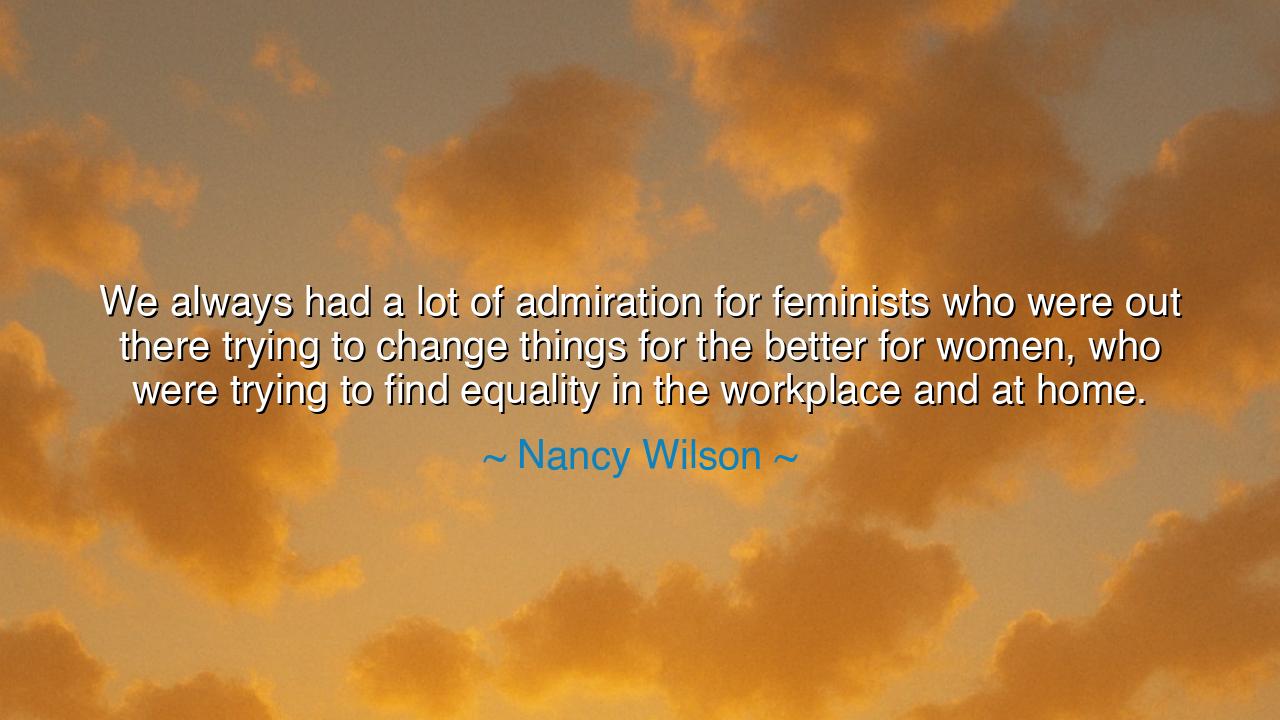
We always had a lot of admiration for feminists who were out
We always had a lot of admiration for feminists who were out there trying to change things for the better for women, who were trying to find equality in the workplace and at home.






We always had a lot of admiration for feminists—this simple yet profound acknowledgment by Nancy Wilson speaks to a deep respect for those who have dedicated their lives to the struggle for equality and justice. In this statement, she not only honors the work of those who have fought for women’s rights, but also calls attention to the essential and timeless struggle for equality in all aspects of life—whether in the workplace, the home, or the very fabric of society itself. For what is feminism, if not a call to arms against the forces that have long sought to limit the agency and power of women? It is a movement that seeks not just to change the world but to transform it, to break down barriers, and to build a new, just foundation for future generations.
Throughout the course of history, the feminist movement has been an unwavering beacon of hope for those who have been silenced, marginalized, and oppressed. The battle for equality in the workplace and at home is not a new one, nor is it one that has been easily won. Consider the tale of Susan B. Anthony, whose tireless efforts in the late 19th and early 20th centuries paved the way for the right of women to vote in the United States. She, alongside countless others, understood that equality was not merely a political ideal but a necessity—one that required not just words, but actions, bold and unyielding. Her courage inspired millions, for she knew that the world could never be whole, never be just, while half of its people were denied the rights and opportunities that they were entitled to.
Yet the fight for equality was not confined to the political arena alone. It extended far beyond the halls of Congress and into the very home—the place where women were often seen and not heard, their labor invisible and undervalued. In many societies, the home was a space of gendered inequality, where women were expected to shoulder the burden of domestic labor, often at the expense of their personal growth and dreams. The feminist movement, with its call for equality, demanded that women not only have a voice in the workplace but also in the home—in the choices they made, in the partnerships they entered, and in the very way their lives were organized. As Betty Friedan wrote in The Feminine Mystique, the traditional role of women as homemakers often confined them to a life of unfulfilled potential, a life where they were denied the opportunity to fully participate in the world beyond their front doors.
Nancy Wilson’s admiration for the feminists who fought for change reflects a deep understanding of the struggle that so many women have endured. These feminists, whether they were marching in the streets, writing manifestos, or advocating for legal reform, were not simply trying to change things; they were trying to reshape society itself. They sought a world where women were not defined by the narrow confines of outdated gender roles but were free to pursue their passions, careers, and ambitions without fear of discrimination or retribution. Theirs was a struggle that transcended the personal and the political, for the fight for equality in the workplace and at home was a fight for freedom—the freedom for women to live as equals, not just in the eyes of the law, but in the eyes of society.
Consider the life of Gloria Steinem, whose work in the 1960s and 1970s helped to elevate the feminist movement to the forefront of public consciousness. Through her writing and activism, she challenged the accepted norms of the time and brought attention to the ways in which women were systematically oppressed, both in the workplace and in the home. Her tireless work inspired countless women to take up the mantle of feminism, to stand up for their rights, and to demand the freedom and equality they so rightfully deserved. Steinem’s voice was one of clarity and strength, a voice that echoed through the hearts of those who knew, deep down, that true equality was not just a lofty ideal, but a necessity for the flourishing of all people.
Thus, the lesson to be drawn from the wisdom of Nancy Wilson and the countless feminists she admires is this: the struggle for equality is not a singular or fleeting battle, but a continuous, lifelong journey. Equality in the workplace and at home—true equality—requires not just the breaking of laws or the passing of policies, but the changing of minds and hearts. It demands that we, as individuals and as a society, recognize the inherent dignity and worth of every human being, regardless of gender. It calls on us to celebrate diversity, to give voice to the voiceless, and to never accept a world where anyone is denied their rights or opportunities based on their gender.
So, future generations, take this lesson to heart: feminism is not a call for division, but for unity, not for domination, but for equality. Whether in the workplace, the home, or in every aspect of life, we must continue the fight for a world where all people—women and men alike—are given the opportunity to reach their fullest potential. Stand beside those who seek justice, advocate for the rights of those who are denied them, and never cease in your efforts to build a world where equality is the birthright of all. Only then can we truly say we have honored the struggles and sacrifices of those who have come before us and shaped the future with wisdom, compassion, and unyielding strength.






AAdministratorAdministrator
Welcome, honored guests. Please leave a comment, we will respond soon